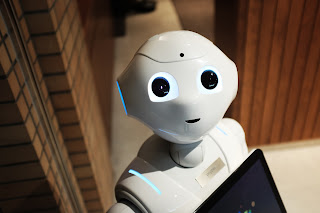Unlocking the Power of Artificial Intelligence: Revolutionizing Our World
Unlocking the Power of Artificial Intelligence: Revolutionizing Our World
In the fast-paced world of technology, one term has become increasingly popular and captivating: Artificial Intelligence (AI). It has evolved from being a mere concept in science fiction to a transformative force that is reshaping multiple aspects of our lives. From improving healthcare to enhancing transportation systems and revolutionizing industries, AI has emerged as a game-changer. In this blog, we will explore the incredible potential of AI, its current applications, and the impact it is making on society.
- Understanding Artificial Intelligence:
Artificial Intelligence refers to the development of computer systems that can perform tasks that typically require human intelligence, such as visual perception, speech recognition, decision-making, and problem-solving. AI encompasses various subfields, including machine learning, natural language processing, computer vision, and robotics.
- Machine Learning: The Foundation of AI:
Machine Learning (ML) is a subset of AI that enables systems to learn from data without being explicitly programmed. By using algorithms and statistical models, ML allows machines to improve their performance over time and make accurate predictions or decisions. ML algorithms analyze large datasets, identify patterns, and extract valuable insights, enabling AI systems to provide meaningful outputs.
- AI in Everyday Life:
AI has permeated many aspects of our daily lives, often without us even realizing it. Virtual assistants like Siri and Alexa have become household names, utilizing natural language processing and voice recognition to answer questions, set reminders, and control smart devices. Online recommendation systems employ AI algorithms to suggest products, movies, and music based on our preferences. Social media platforms leverage AI to personalize our news feeds and display targeted advertisements.
- Healthcare Revolutionized by AI:
AI is making significant strides in healthcare, transforming diagnostics, drug discovery, and patient care. Machine learning algorithms can analyze medical images, such as X-rays and MRIs, to detect diseases like cancer with high accuracy. AI-powered chatbots and virtual nurses provide round-the-clock support, answering patients' questions and monitoring their symptoms. AI algorithms also aid in the development of personalized treatments and precision medicine.
- AI and Transportation:
The transportation industry is experiencing a revolution with the integration of AI. Self-driving cars, powered by advanced AI algorithms and computer vision, offer the potential to enhance road safety and reduce accidents caused by human error. AI-powered traffic management systems optimize traffic flow, reducing congestion and travel times. Drones are being used for delivery services, infrastructure inspections, and disaster management, thanks to AI's capabilities.
- AI and Industry 4.0:
AI is driving the fourth industrial revolution, known as Industry 4.0, by enabling automation and optimization of manufacturing processes. Robots equipped with AI algorithms can perform complex tasks with precision, improving productivity and efficiency. AI-powered predictive maintenance systems analyze sensor data to detect potential equipment failures and optimize maintenance schedules, reducing downtime and costs. Supply chain management also benefits from AI, optimizing logistics, inventory management, and demand forecasting.
- Ethical Considerations and Challenges:
As AI becomes more pervasive, ethical considerations become paramount. Ensuring fairness, transparency, and accountability in AI algorithms is crucial to avoid biased decision-making and discrimination. Privacy concerns arise with the collection and use of vast amounts of personal data. The potential impact of AI on employment is another critical concern, as automation could replace certain job roles. Addressing these challenges requires collaboration between policymakers, industry experts, and society as a whole.
8. The Future of AI:
The potential of AI is limitless, and its impact will only grow in the future. AI will continue to advance healthcare, making early disease detection and personalized treatments more accessible. Smart cities will leverage AI to optimize resource allocation, energy management, and urban planning. Education will be transformed through personalized AI tutors and adaptive learning platforms
5 Interesting Facts About AI:
AI Has Surpassed Human Abilities in Specific Tasks:
While AI may not possess general human intelligence, it has already surpassed human capabilities in certain specialized tasks. For example, in 1997, IBM's Deep Blue defeated world chess champion Garry Kasparov. More recently, AI algorithms have achieved superhuman performance in complex games like Go and poker. These accomplishments highlight the immense potential of AI to excel in specific domains.
AI Can Generate Realistic Art and Music:
AI algorithms are now capable of producing artwork and composing music that is indistinguishable from human-created pieces. Generative Adversarial Networks (GANs) can generate realistic images, while deep learning models can compose original music in various styles. This blurring of creativity between humans and machines raises intriguing questions about the nature of art and the role of AI in creative endeavors.
AI Can Aid in Disaster Response and Relief Efforts:
AI technology is proving to be invaluable in disaster response and relief efforts. AI algorithms can analyze satellite imagery and aerial footage to identify areas affected by natural disasters, enabling rapid response and allocation of resources. Additionally, AI-powered chatbots can provide crucial information and support to affected individuals, helping coordinate relief efforts and connect people with essential services.
AI Assistants Are Becoming More Personalized and Emotional:
Virtual assistants like Siri, Alexa, and Google Assistant are continually evolving to provide more personalized and emotionally intelligent interactions. Natural language processing and sentiment analysis allow these AI assistants to recognize and respond to human emotions, tailoring their responses accordingly. This advancement in AI's emotional understanding paves the way for more empathetic and human-like interactions with AI systems.
AI in Healthcare Can Predict Diseases and Aid in Drug Discovery:
AI is revolutionizing healthcare by enabling early disease prediction and facilitating drug discovery. Machine learning models can analyze vast amounts of patient data to identify patterns and predict the likelihood of diseases such as diabetes, heart conditions, and even certain types of cancer. AI algorithms also aid in drug discovery by quickly analyzing vast databases of chemical compounds, identifying potential drug candidates, and accelerating the research and development process.
Conclusion:
Artificial Intelligence continues to astonish us with its capabilities and potential. From surpassing human abilities in specialized tasks to generating artwork and music, AI is blurring the lines between human and machine creativity. It is also proving instrumental in disaster response and relief efforts, providing personalized and emotionally intelligent interactions, and revolutionizing healthcare with disease prediction and drug discovery. As AI continues to advance, it holds the promise of transforming numerous industries and shaping the future of our world.






Comments
Post a Comment